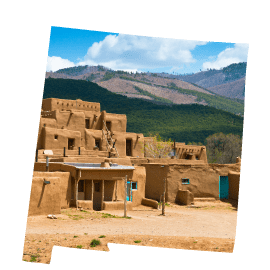Providers: New Mexico
Alternate Routes Policy
Analysis of New Mexico's policies
Alternate Route Providers: New Mexico allows a diversity of alternate route program providers, including district-led programs such as the Santa Fe Public Schools Fellows Program. The state's alternate route programs, however, are run in collaboration with institutions of higher education.
Recommendations for New Mexico
Further expand the diversity of alternate route providers.
New Mexico should continue to consider policies that encourage additional providers beyond what the state currently offers, including alternate route programs offered by school districts and other nonprofit organizations that are not run in collaboration with institutions of higher education. A robust diversity of providers has the potential to help all programs, both university- and non-university-based, to improve.
State response to our analysis
New Mexico provided that it also offers opportunities for districts to use the NMTEACH effectiveness system to establish criteria for alternative licensure of teachers. The state noted that this means that teachers using the NMTEACH route must have at least two years of "effective" ratings to obtain full licensure, and that when teachers obtain licensure via this route, they can advance licenses and count their years of service in the licensure system.
Updated: December 2017
Select another topic
General Teacher Preparation
- Program Entry
- Teacher Shortages and Surpluses
- Program Performance Measures
- Program Reporting Requirements
- Student Teaching/Clinical Practice
- Teaching Methods
Elementary Teacher Preparation
Secondary Teacher Preparation
- Middle School Content Knowledge
- Middle School Licensure Deficiencies
- Adolescent Literacy
- Secondary Content Knowledge
- Secondary Licensure Deficiencies
Special Education Teacher Preparation
Alternate Routes
Hiring
- Requirements for Out-of-State Teachers
- Provisional and Emergency Licensure
- Licensure for Substitute Teachers
- Supporting New Teachers
Teacher and Principal Evaluation
Teacher Compensation
Retaining Effective Teachers
Early Childhood Preparation
How we graded
Research rationale
Alternate routes should be structured to do more than just address shortages; they should provide an alternative pipeline for talented individuals to enter the profession.[1] Many states have structured their alternate routes as a streamlined means to certify teachers in shortage subjects, grades, or geographic areas. A true alternate route creates a new pipeline of potential teachers by certifying those with valuable knowledge and skills who did not prepare to teach as undergraduates and are disinclined to fulfill the requirements of a new degree.
Some states claim that the limitations they place on the use of their alternate routes impose quality control. However, states control the criteria for who is admitted and who is licensed. With appropriate standards for admission and program accountability, quality can be safeguarded without casting alternate routes as routes of last resort or branding alternate route teachers "second-class citizens."[2]
[1] For a general, quantitative review of the research supporting the need for states to offer an alternate route license, and why alternate routes should not be treated as programs of "last resort," one need simply look at the numbers of uncertified and out of field teachers in classrooms today, readily available from the National Center for Education Statistics. In addition, with U.S. schools facing the need to hire more than 3.5 million new teachers each year, the need for alternate routes to certification cannot be underestimated. See also: Ducharme, E. R., & Ducharme, M. K. (1998). Quantity and quality: Not enough to go around. Journal of Teacher Education, 49(3), 163-165.
[2] Specifically, evidence of the effectiveness of candidates in respectable and selective alternate certification requirements can be found in: Constantine, J., Player, D., Silva, T., Hallgren, K., Grider, M., & Deke, J. (2009). An evaluation of teachers trained through different routes to certification. Final Report. NCEE 2009-4043. National Center for Education Evaluation and Regional Assistance. Retrieved from http://files.eric.ed.gov/fulltext/ED504313.pdf; Boyd, D., Grossman, P., Lankford, H., Loeb, S., & Wyckoff, J. (2005). How changes in entry requirements alter the teacher workforce and affect student achievement (NBER Working Paper No. 11844). National Bureau of Economic Research. Retrieved from http://www.nber.org/papers/w11844.pdf?new_window=1; Kane, T. J., Rockoff, J. E., & Staiger, D. O. (2008). What does certification tell us about teacher effectiveness? Evidence from New York City. Economics of Education Review, 27(6), 615-631. Retrieved from http://www.nber.org/papers/w12155.pdf?new_window=1; For evidence that alternate route programs offered by institutions of higher education are often virtually identical to traditional programs, see: Walsh, K., & Jacobs, S. (2007). Alternative certification isn't alternative. Thomas B. Fordham Institute, National Council on Teacher Quality. Retrieved from: http://www.nctq.org/p/publications/docs/Alternative_Certification_Isnt_Alternative_20071124023109.pdf; A number of studies have also found alternative certification programs, such as Teach for America, produce teachers that were more effective at improving student achievement than other teachers with similar levels of experience. See: Xu, Z., Hannaway, J., & Taylor, C. (2011). Making a difference? The effects of Teach for America in high school. Journal of Policy Analysis and Management, 30(3), 447-469. Retrieved from http://www.urban.org/UploadedPDF/411642_Teach_America.pdf; Boyd, D., Grossman, P., Hammerness, K., Lankford, H., Loeb, S., Ronfeldt, M., & Wyckoff, J. (2010). Recruiting effective math teachers: How do math immersion teachers compare? Evidence from New York City (No. w16017). National Bureau of Economic Research. Retrieved from http://www.nber.org/papers/w16017.pdf?new_window=1

